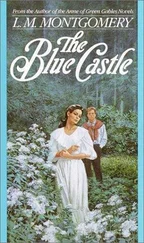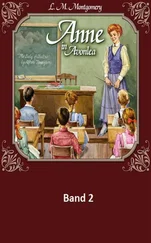"Why, she'll soon be grown up. She can't expect you to provide for her indefinitely ... “
"I don't," Emily whispered resentfully under her breath.
" — and it's time we decided what is best to be done for her.”
"The Murray women have never had to work out for a living," said Aunt Elizabeth, as if that disposed of the matter.
"Emily is only half Murray," said Wallace. "Besides, times are changing. You and Laura will not live for ever, Elizabeth, and when you are gone New Moon goes to Oliver's Andrew. In my opinion Emily should be fitted to support herself if necessary.”
Emily did not like Uncle Wallace but she was very grateful to him at that moment. Whatever his motives were he was proposing the very thing she secretly yearned for.
"I would suggest," said Uncle Wallace, "that she be sent to Queen's Academy to get a teacher's licence. Teaching is a genteel, ladylike occupation. I will do my share in providing for the expense of it.”
A blind person might have seen that Uncle Wallace thought this very splendid of himself.
"If you do," thought Emily, "I'll pay every cent back to you as soon as I'm able to earn it.”
But Aunt Elizabeth was adamant.
"I do not believe in girls going out into the world," she said. "I don't mean Emily to go to Queen's. I told Mr. Carpenter so when he came to see me about her taking up the Entrance work. He was very rude — schoolteachers knew their place better in my father's time.
But I made him understand, I think. I'm rather surprised at YOU, Wallace. You did not send your own daughter out to work.”
"MY daughter had parents to provide for her," retorted Uncle Wallace pompously. "Emily is an orphan. I imagined from what I had heard about her that she would prefer earning her own living to living on charity.”
"So I would," cried out Emily. "So I would, Uncle Wallace. Oh, Aunt Elizabeth, please let me study for the Entrance. Please!
I'll pay you back every cent you spend on it — I will indeed. I pledge you my word of honour.”
"It does not happen to be a question of money," said Aunt Elizabeth in her stateliest manner. "I undertook to provide for you, Emily, and I will do it. When you are older I may send you to the High School in Shrewsbury for a couple of years. I am not decrying education. But you are not going to be a slave to the public — no Murray girl ever was THAT.”
Emily realizing the uselessness of pleading, went out in the same bitter disappointment she had felt after Mr Carpenter's visit.
Then Aunt Elizabeth looked at Wallace.
"Have you forgotten what came of sending Juliet to Queen's?" she asked significantly.
If Emily was not allowed to take up the Entrance classes, Perry had no one to say him nay and he went at them with the same dogged determination he showed in all other matters. Perry's status at New Moon had changed subtly and steadily. Aunt Elizabeth had ceased to refer scornfully to him as "a hired boy." Even she recognized that though he was still undubitably a hired boy he was not going to remain one, and she no longer objected to Laura's patching up his ragged bits of clothing, or to Emily's helping him with his lessons in the kitchen after supper, nor did she growl when Cousin Jimmy began to pay him a certain small wage — though older boys than Perry were still glad to put in the winter months choring for board and lodging in some comfortable home. If a future premier was in the making at New Moon Aunt Elizabeth wanted to have some small share in the making. It was credible and commendable that a boy should have ambitions. A girl was an entirely different matter. A girl's place was at home.
Emily helped Perry work out algebra problems and heard his lessons in French and Latin. She picked up more thus than Aunt Elizabeth would have approved and more still when the Entrance pupils talked those languages in school. It was quite an easy matter for a girl who had once upon a time invented a language of her own. When George Bates, by way of showing off, asked her one day in French — HIS French, of which Mr Carpenter had once said doubtfully that perhaps God might understand it — "Have you the ink of my grandmother and the shoebrush of my cousin and the umbrella of my aunt's HUSBAND in your desk?" Emily retorted quite as glibly and QUITE as Frenchily, "No, but I have the pen of your father and the cheese of the innkeeper and the towel of your uncle's maidservant in my basket.”
To console herself for her disappointment in regard to the Entrance class Emily wrote more poetry than ever. It was especially delightful to write poetry on a winter evening when the storm winds howled without and heaped the garden and orchard with big ghostly drifts, starred over with rabbits' candles. She also wrote several stories — desperate love affairs wherein she struggled heroically against the difficulties of affectionate dialogue; tales of bandits and pirates — Emily liked these because there was no necessity for bandits and pirates to converse lovingly; tragedies of earls and countesses whose conversation she dearly loved to pepper with scraps of French; and a dozen other subjects she didn't know anything about. She also meditated beginning a novel but decided it would be too hard to get enough paper for it. The letter-bills were all done now and the Jimmy-books were not big enough, though a new one always appeared mysteriously in her school basket when the old one was almost full. Cousin Jimmy seemed to have an uncanny prescience of the proper time — that was part of his Jimmyness.
Then one night, as she lay in her lookout bed and watched a full moon gleaming lustrously from a cloudless sky across the valley, she had a sudden dazzling idea.
She would send her latest poem to the Charlottetown Enterprise.
The Enterprise had a Poet's Corner where "original" verses were frequently printed. Privately Emily thought her own were quite as good — as probably they were, for most of the Enterprise "poems” were sad trash.
Emily was so excited over the idea that she could not sleep for the greater part of the night — and didn't want to. It was glorious to lie there, thrilling in the darkness, and picture the whole thing out. She saw her verses in print signed E. Byrd Starr — she saw Aunt Laura's eyes shining with pride — she saw Mr Carpenter pointing them out to strangers — "the work of a pupil of mine, by gad" — she saw all her schoolmates envying her or admiring, according to type — she saw herself with one foot at least firmly planted on the ladder of fame — one hill at least of the Alpine Path crested, with a new and glorious prospect opening therefrom.
Morning came. Emily went to school, so absent-minded because of her secret that she did badly in everything and was raged at by Mr Carpenter. But it all slipped off her like the proverbial water off a duck's back. Her body was in Blair Water school but her spirit was in kingdoms empyreal.
As soon as school was out she betook herself to the garret with half a sheet of blue-lined notepaper. Very painstakingly she copied down the poem, being especially careful to dot every i and cross every t. She wrote it on both sides of the paper, being in blissful ignorance of any taboo thereon. Then she read it aloud delightedly, not omitting the title Evening Dreams. There was one line in it she tasted two or three times: The haunting elfin music of the air.
"I think that line is VERY good," said Emily. "I wonder now how I happened to think of it.”
She mailed her poem the next day and lived in a delicious mystic rapture until the following Saturday. When the Enterprise came she opened it with tremulous eagerness and ice-cold fingers, and turned to the Poet's Corner. Now for her great moment!
There was not a sign of an Evening Dream about it!
Emily threw down the Enterprise and fled to the garret dormer where, face downward on the old hair-cloth sofa, she wept out her bitterness of disappointment. She drained the draught of failure to the very dregs. It was horribly real and tragic to her. She felt exactly as if she had been slapped in the face. She was crushed in the very dust of humiliation and was sure she could never rise again.
Читать дальше


